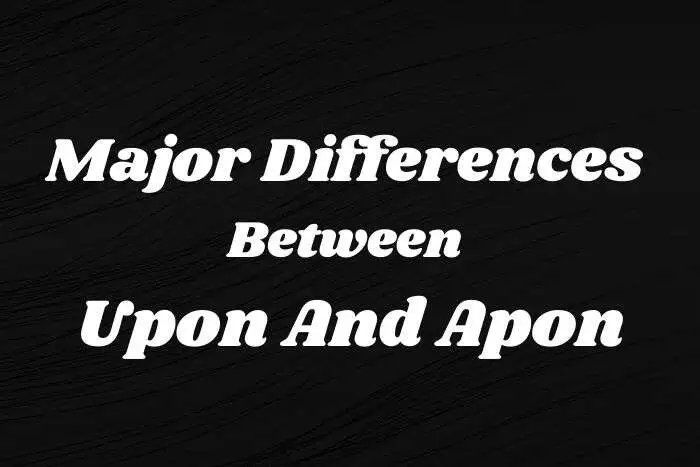
Upon vs Apon
Upon and apon are prepositions which are used in a similar manner but at different eras of the English language.
Upon
Upon is used as a preposition. It is used to show the relationship of the pronoun or noun with other words in a sentence. The preposition “upon” is used in many ways. Some of them are described with examples.
“Upon” means “on” and “up,” for example:
The girl mounted upon her new pony and was very happy to ride it.
Something or someone in a position which is elevated, for example:
There are flags of the nation upon every home on the fourth of July.
In contact with completely or in contact with approximately. This contact being with time or a special occasion or someone like an attacker, for example:
The holiday season is upon us, and we have to finish our gift shopping as soon as possible.
Their enemies were upon them and they had no backup.
Soon after something or immediately, for example:
She started exercising upon her children’s birth that is why she got into shape so fast.
On the event of, for example:
He was very happy upon seeing his whole family gather under one roof.
Used as a more specific version of “on,” here the use is not related to any kind of elevation. “Upon” is preferred sometimes for euphonic reasons. For example:
The gentlemen swore upon their honor to protect the weak.
Apon
“Apon” is a word or preposition, to be specific, which is not used anymore in Modern English. This preposition was commonly in use in the Middle English era. It was actually the way “upon” was spelled at that time.
With time, spellings were changed. People started adopting and adapting to the changes in the spellings. “Apon” was completely stopped being used and was or is now used sometimes in poetry. For example:
Full derly to hym that ye pray
To hym that was don apon a tre
To safe yowr sallis on dowymysday
Qwen all salles savyd mon be.”
The Sinner’s Lament http://www.lib.rochester.edu/Camelot/teams/lamennts.htm
In Middle English, many words with prefixes u- were spelled using the prefix “a”. Later the spellings were made standard, and the use of “a-” ceased. Now in the modern spellings, the word or preposition “apon” is spelled as “upon.” They are actually the same word, only the use has been in different eras.
Summary:
1.“Apon” and “upon” are the same word; both are prepositions which are used to show the relationship of the pronoun or noun in a sentence with other words. However, “apon” and “upon” are different from each other by centuries as 2.“apon” was used in Middle English while upon is used in Modern English.



















